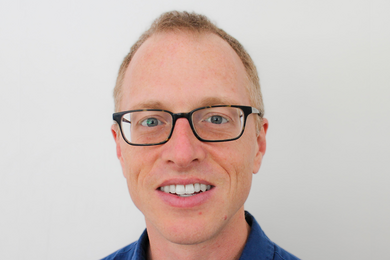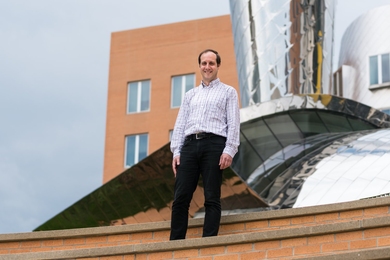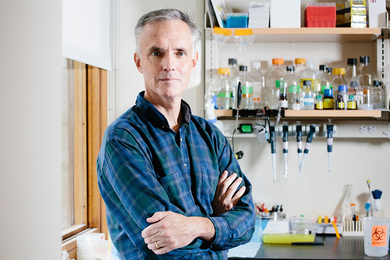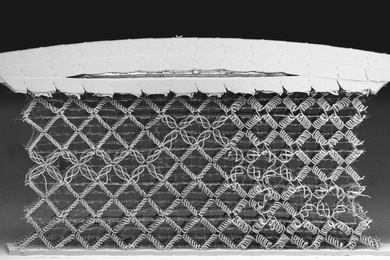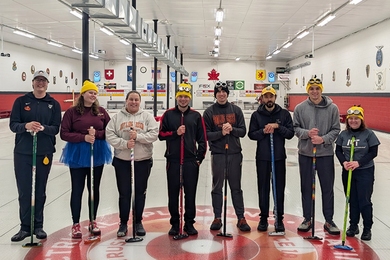HOME PAGE PRAISE
The March issue of Quark, an Italian magazine, featured the MIT home page on a list of particularly good web sites.
Quark encouraged readers visiting the site "to explore the campus map and the fantastic variations of the home page graphic," adding that the MIT home page is "a required visit for anyone who wants to see the future of inventions and research projects that may changethe life of the next generations."
The story was originally sent to the News Office, but no one there knows Italian, so it was quickly rerouted to Suzana Lisanti (head of Web Communications Services), who does indeed read Italian and also happens to be leader of the team responsible for the home page.
REFLECTIONS ON MIR
The demise of the Russian space station Mir last month led to a variety of news stories on the space station and its place in history.
In a March 22 Voice of America radio program, Professor Laurence Young described Mir as "truly a tour de force... What it did first of all was convince us that it was possible to support people in space for long-duration flights, as long as over 400 days, something that a number of us had doubted."
Although the relationship between Americans and Russians working with Mir "was not perfect," according to reporter Fred Cooper, there were still several success stories. According to Professor Young, they included the ability "to get more and more detailed and quantitative information on how bones were deteriorating, looking at what kind of shape the cosmonauts were in when they came back,[and] looking at the process of rebuilding the bone during the rehabilitation period." Professor Young is the Apollo Program Professor of Astronautics and director of the National Space Biomedical Research Institute.
VEST IN ENGLAND
President Charles Vest's February trip to the United Kingdom was front-page news in Cambridge, England. According to the February 20 issue of the Cambridge Evening News, Dr. Vest "drew an excess-capacity crowd" when he addressed the Cambridge Network about life at MIT. Also according to the newspaper, Dr. Vest was staying in the UK "as a guest of the Queen."
THOSE GUYS ARE GODS
As a result of being a finalist in the Intel Science Talent Search, California high school student Nathaniel Craig got to meet a number of important people, including President George Bush and Vice President Dick Cheney. According to the March 13 San Francisco Chronicle, however, "the bigger thrill came from meeting his science idols: Prof. Douglas Osheroff of Stanford, a 1996 Nobel laureate, and Prof. Frank Wilczek of MIT.
"'Those guys are gods of applied physics!' Craig said."
Mr. Craig, by the way, placed second among the 40 finalists.
CHOMSKY ON ANDi
The announcement of ANDi, the first genetically modified monkey, prompted stories around the globe on the ethical implications of the work. In England, Daniel Johnson and Thomas Harding of the Daily Telegraph asked seven leading philosophers for their opinions. One of these was Institute Professor Noam Chomsky. Among his comments:
"We are getting to the point where serious questions arise about tampering with the living world. We have to consider whether these genetic modifications are in fact a form of torture for these animals.
"There are two kinds of questions we have to ask. Firstly, is it something we can significantly benefit from? That is not something I feel qualified to answer.
"Secondly, is it possibly a step towards dealing with serious health problems for humans? I think it is, and this kind of work should not be wiped out. But there should be more controls and serious evaluations."
CLIPS AND QUOTES
The addition of the Destiny science module to the International Space Station last month is "the difference between camping out and having a laboratory," Professor Laurence Young told the Boston Globe's David Chandler in a February 7 story on the feat that also ran in papers including the Spokane (WA) Spokesman-Review. Dr. Young is the Apollo Program Professor of Astronautics.
"The future of television is moving from a broadcasting model to one akin to the publishing industry. People will choose what they want to see when they want to see it, just as they read what they want when they want." -- Andy Lippman, senior research scientist at the Media Lab, in a January 15 Orlando Sentinel story about video on demand. The piece also ran in papers including the Lawrence (KS) Journal-World.
"If there are folks out there saying they're afraid to use computers, we [in the design and research community] are the reason why. We spend so much time thinking about the input and output devices of the computer that we've forgotten about the people relating to it." -- Joe Coughlin, director of the AgeLab, in a March 8 Boston Globe story about the elderly and learning.
"As far as I can see, Bush's plan does not offer any new money for defense above the Clinton plan." -- Cindy Williams, principalresearch scientist in the Center for International Studies, in a February 13 Knight-Ridder story about President Bush's proposed $5.7 billion hike for the military that ran in a number of newspapers.
"What's tough is not bringing something down, but bringing something down in a controlled way." -- Professor of Aeronautics and Astronautics Daniel Hastings in a January 26 Knight-Ridder story about removing some of the "space junk" circling Earth. The story appeared in papers including Stockton (CA) Record and the Scranton (PA) Times-Tribune.
"Consciousness has been discussed for probably thousands of years, but it's not a problem that science is ever likely to illuminate." -- Steven Pinker, the Peter de Florez Professor of Psychology, in a January 14 Boston Globe story about research onthe brain.
"Amtrak is a system the country needs. We should be spending more money, not forcing them to live on less." -- Carl Martland, a senior research associate in the Department of Civil and Environmental Engineering, in a March 20 Christian Science Monitor story about the federally subsidized train system.
"Stepping into the Media Laboratory at the world-famous Massachusetts Institute of Technology is like entering a zany hi-tech world somewhere between the Starship Enterprise and Willie Wonka's Chocolate Factory." -- Kenneth Walton, writing about thelab in a March 26 story for the Scotsman.
"We are going to go in one of two directions -- optical scanners or electronic voting." -- Professor Stephen Ansolabehere of political science in a March 23 Christian Science Monitor story about voting technology.
A version of this article appeared in MIT Tech Talk on April 11, 2001.
